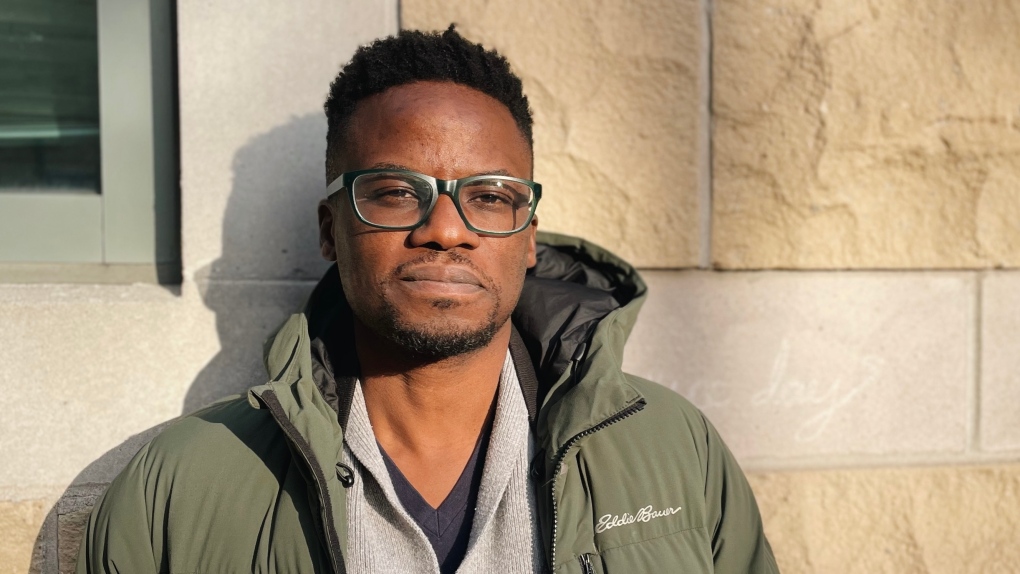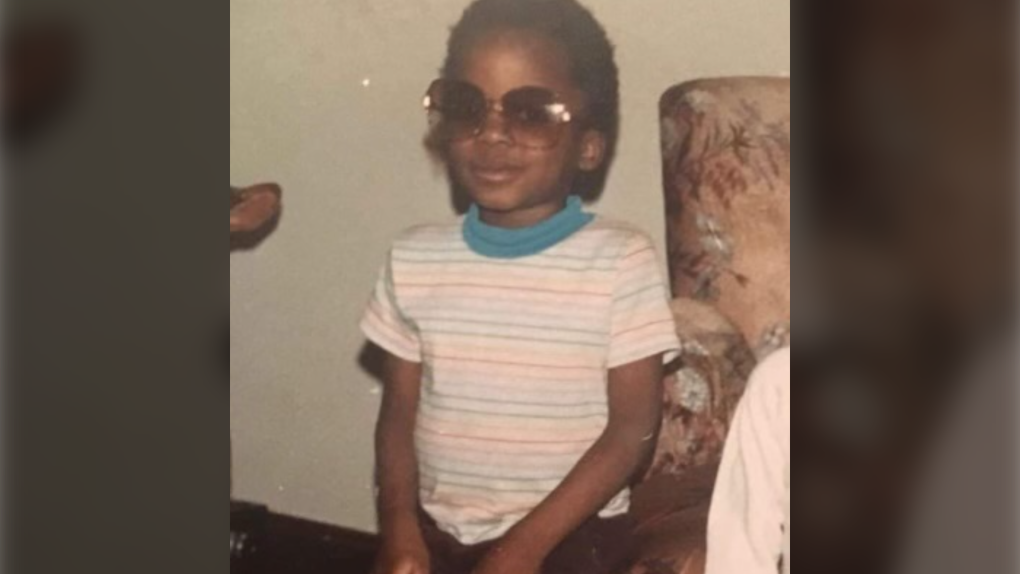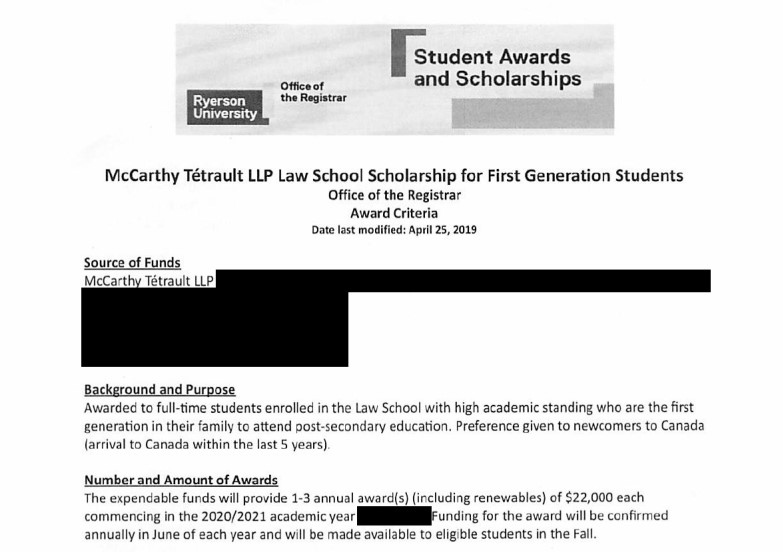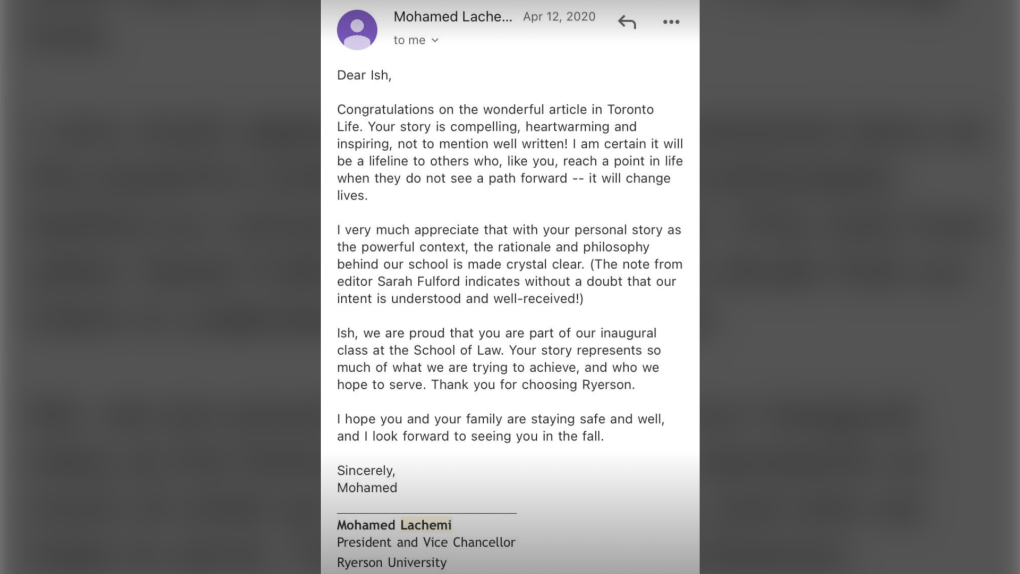Once incarcerated, this Toronto activist was accepted into TMU Law's inaugural year. Now, he's suing the school for $300K
 Ish Aderonmu is seeking $300,000 in damages from Toronto Metropolitan University in a civil lawsuit that alleges the institution convinced him to attend on 'broken' financial promises and used his likeness for commercial gain. (Abby O'Brien/CTV News Toronto)
Ish Aderonmu is seeking $300,000 in damages from Toronto Metropolitan University in a civil lawsuit that alleges the institution convinced him to attend on 'broken' financial promises and used his likeness for commercial gain. (Abby O'Brien/CTV News Toronto)
Three years after accepting an offer to Toronto's newest law school, a former student is suing the institution, claiming they convinced him to apply to the program with “broken promises” of financial support while using his likeness and reputation to promote the new school.
Ish Aderonmu has lived experience in the justice system -- he spent just over 50 days in two Philadelphia county jails after getting busted for selling drugs in 2010. So when he was accepted into the inaugural year of Toronto Metropolitan University’s (TMU) Lincoln Alexander School of Law 10 years later, he considered it a fresh start.
- Download our app to get local alerts on your device
- Get the latest local updates right to your inbox
His time in law school didn’t go as planned, though. In a civil lawsuit filed with the Superior Court of Justice, Aderonmu claims the institution is liable for negligent misrepresentation, negligent infliction of mental and emotional distress, appropriation of likeness, and breach of duty of good faith to the amount of $300,000 in damages.
"I was very excited to learn the law,” Aderonmu, 39, told CTV News Toronto last week. “I saw it as a place where I could help write a new story.”
The court document, reviewed by CTV News Toronto, claims that university administration, including the interim Dean of Law, Anver Saloojee, "strongly encouraged" Aderonmu to apply, promising he would receive the financial support needed to cover the costs, and failed to follow through. Over the course of a-year-and-a-half in the program, the school provided him with a one-time bursary of $10,000, it claims.
Aderonmu claims he was sent into debt, faced eviction, and ultimately had to drop out in December 2021,
The former student is also alleging that the school used his likeness and reputation as an activist and writer to promote the program without his consent.
In its Statement of Defence and when reached for comment by CTV News Toronto, Toronto Metropolitan University denied Aderonmu’s claims. The university argues it never promised a certain amount of financial support and that it took significant measures to try and secure him the needed aid. It denied using Aderonmu's likeness without his consent.
A spokesperson for TMU maintained that throughout the university’s interactions with Aderonmu staff acted in an appropriate, fair and compassionate manner. They declined to provide further comment while the matter remains before the courts.
The lawsuit follows a former Human Rights Complaint filed by Aderonmu against the school, which was dismissed on the basis that the claims presented failed to serve as evidence of discrimination and therefore fell outside of the Tribunal’s jurisdiction.
The allegations have not been tested in court.
EXPERIENCE IN THE JUSTICE SYSTEM
When Aderonmu pleaded guilty to a charge of possession laid on him by Philadelphia police in 2010, he thought he was signing up for six months of house arrest, followed by two years of probation.
It wasn’t until he was standing before a judge to make the plea that he said he was informed the decision would likely affect his U.S. immigration status – Aderonmu was born in Nigeria, before moving to Canada as a toddler, and the U.S. in his teens.
 A young Ish Aderonmu can be seen above. (Handout by Aderonmu)
A young Ish Aderonmu can be seen above. (Handout by Aderonmu)
“In the middle of proceedings, the judge asked if I knew [the plea] could affect my immigration status and I said no,’” he said. “I should have known, but I really had no clue.”
Two years later and nearing the end of his probation, Aderonmu was placed into custody once again. He was walking his dog, Sasha, in his Philadelphia neighbourhood when two immigration officers approached and arrested him.
He was eventually taken to an ICE detention centre at York County Prison in Pennsylvania where he remained for 45 days before being granted a voluntary departure back to Canada.
It was his experience in the justice system, in part, that informed his dream of becoming a lawyer.
“Until then, nobody had told me I could be a lawyer,” Aderonmu said.
“The most difficult thing about realizing I wanted to was also realizing that, up until that point, I had been second-guessing myself based on other people’s ideas about me.”
Since returning to Canada, Aderonmu has worked as a research lead on a municipal campaign and as a policy advisor at a non-profit promoting civic engagement, among other positions. He's spoken publicly a number of times on the justice system and haspublished a variety of written works on his experience.
THE LINCOLN ALEXANDER SCHOOL OF LAW
It wasn’t until 2019 that Aderonmu first seriously considered applying to law school, his claim reads. At the time, he was receiving Ontario Works and knew he could only attend a university that could provide him with sufficient financial aid, the document states.
He had amassed experience in policy and activism at this point, having volunteered with a political campaign in 2018/
In the fall of 2019, the Plaintiff met with TMU admissions to learn about the Law Program. They advised him he would be an excellent candidate, the claim alleges.
He was concerned about tuition, expected to be approximately $15,000 a year, and expressed to administration that he wouldn’t be able to attend the program without assistance, the document states.
“There was no information available to the contrary,” the claim states.
In a meeting with the interim Dean of Law in 2019, Aderonmu said he was told there would be “plenty of full-ride” financial aid options available.
“Dean Saloojee stated that the Plaintiff would be eligible for funding allocated to students from marginalized and low-income backgrounds,” the claim reads.
While TMU admitted that it met with Adernomu multiple times over the fall of 2019, it denied that it ever suggested the former student would receive full-ride financial aid.
In November 2019, Aderonmu applied to both York University's Osgoode Law School and the Lincoln Alexander School of Law.
He accepted an offer to the latter on Jan. 21, 2020.
Aderonmu did not receive any funding for nearly a year. In November 2020 he was given a one-time scholarship of $10,000, his claim states. He subsequently found out that tuition would cost him $22,500 a year.
In its response, the school argued that the $10,000 bursary it gave Aderonmu was “highest entrance scholarships in the Program’s inaugural year that was available at the time of his admission.” A freedom of information request later filed by Aderonmu, however, shows that at least two $22,000 scholarships were reserved for first-generation immigrant students entering the 2020 year.
In a meeting in November 2020 with the law school’s Vice-President of Equity and Community Inclusion, Aderonmu claims he expressed his concern regarding his unpaid tuition balance. At this point, he’d estimated that, with tuition and Toronto living costs, he would need approximately $70,000 a year.
 A freedom of information request filed by Aderonmu shows that $22,000 scholarships were available prior.
A freedom of information request filed by Aderonmu shows that $22,000 scholarships were available prior.
“The one-time scholarship he received was of little assistance,” the claim reads.
Facing financial crisis and growing difficulties focusing on his studies, Aderonmu says he deferred his first year of the program to the class of 2024. In turn, TMU denied that Aderonmu deferred due to financial hardship. Rather, it alleges he was struggling academically, so it “reasonably and compassionately” allowed him to retroactively withdraw.
In the following months, Aderonmu continued to meet with the school administration about securing sustainable funding – to no avail, his claim states
In a final attempt to stay in school, he launched a failed attempt to secure a line of credit.
By September, the claim states that he was facing eviction and was forced to represent himself at Ontario’s Landlord and Tenant Board.
Weeks later, after many months worth of attempts to seek assistance from several administrative officials Aderonmu was forced to drop out from the program altogether, the lawsuit alleges.
In its Statement of Defence, the university argues that it made significant efforts to secure financial support for the former student and that it “offered to explore arrangements for the Plaintiff in its student residence,” but that Aderonmu declined.
It also argues that Aderonmu’s departure from the program was not solely due to financial struggles, but also to academic difficulties – the school says he was failing four courses in the fall 2021 semester and admitted to academic misconduct within one of his assignments. Ultimately, the school says it allowed him to depart from the program with no negative impact on his academic record.
Aderonmu chalks the low performance to severe mental distress and financial precarity inflicted upon him by the institution.
PROMOTIONAL MATERIALS
Around the time that Aderonmu was accepted to the Lincoln Alexander School of Law, he was featured in two high-profile pieces of written work – a first-person essay penned about his time spent in an ICE detention centre and a profile in the newspaper about his journey from incarceration to accepting an offer to law school.
“The articles promoted TMU as a “leader” and an “innovator” committed to equity and diversity in law,” the lawsuit claims. “This reflected the vision of the Law Program the Plaintiff was sold by admissions and [the] Dean.”
Following these articles and “unbeknownst to [Aderonmu],” the university proceeded to “capitalize on the Plaintiff’s persona by creating and circulating materials that were intended to drive up admissions and funding,” the claims reads.
The materials were shared both in and outside of the company and were used to promote the program, it states.
At no time did Aderonmu consent to his likeness or materials being shared by the school, he attests in the lawsuit.
The university has outright denied Adernomu’s claims it used his likeness for commercial gain, demanding he provide “strict proof” of such use.
To that, Aderonmu points to a 2020 letter he received from the school's president. The publicity garnered by the works was noted in the letter, in which the president wrote, "I very much appreciate that with your personal story as the power context, the rational and philosophy behind our school is made crystal clear."
“Your story represents so much of what we are trying to achieve, who we hope to serve,” it reads.
In internal correspondence received through freedom of information requests, an administrative employee of the school also referred to Aderonmu as a “great ambassador” for the program.
 An email from President Mohamed Lachemi can be seen above. (Handout: Aderonmu)
An email from President Mohamed Lachemi can be seen above. (Handout: Aderonmu)
At the time, Aderonmu said he agreed. With his life experience, his application and acceptance into the school felt like a natural fit.
“As someone who lives at many intersections, having to bear the weight of xenophobia, anti-Blackness, and the effects of the unjust carceral system, enrolling in this school made so much sense to me,” he said Thursday. “Especially a law school that markets itself as specifically committed to racial justice."
Despite his experience, he said he still plans to seek an education in law.
“I know my community’s out there.”
CTVNews.ca Top Stories

Trump suggests the U.S. should take back the Panama Canal. Could they do that?
Donald Trump suggested Sunday that his new administration could try to regain control of the Panama Canal that the United States 'foolishly' ceded to its Central American ally, contending that shippers are charged 'ridiculous' fees to pass through the vital transportation channel linking the Atlantic and Pacific Oceans.
Weather advisories issued for GTA, areas north of Toronto ahead of 'significant' snowfall
Holiday travellers and commuters could be in for a messy drive on Monday morning as a significant round of snowfall moves into the region.
Nissan, Honda announce plans to merge, creating world's No. 3 automaker
Japanese automakers Honda and Nissan have announced plans to work toward a merger, forming the world's third-largest automaker by sales as the industry undergoes dramatic changes in its transition away from fossil fuels.
Man handed 5th distracted driving charge for using cellphone on Hwy. 417 in Ottawa
An Ottawa driver was charged for using a cellphone behind the wheel on Sunday, the fifth time he has faced distracted driving charges.
Wrongfully convicted N.B. man has mixed feelings since exoneration
Robert Mailman, 76, was exonerated on Jan. 4 of a 1983 murder for which he and his friend Walter Gillespie served lengthy prison terms.
What's open and closed over the holidays in Canada
As Canadians take time off to celebrate the holidays, many federal offices, stores and businesses will be closed across the country on Christmas Day and New Year's Day.
opinion Christmas movies for people who don't like Christmas movies
The holidays can bring up a whole gamut of emotions, not just love and goodwill. So CTV film critic Richard Crouse offers up a list of Christmas movies for people who might not enjoy traditional Christmas movies.
What to know before agreeing to be someone's power of attorney
People often draft a financial power of attorney, a document that gives someone else the authority to manage their money and property on their behalf. But many times, they do so without providing their chosen person with much information about what the duties involve, and sometimes without even telling them they've been appointed.
Can the Governor General do what Pierre Poilievre is asking? This expert says no
A historically difficult week for Prime Minister Justin Trudeau and his Liberal government ended with a renewed push from Conservative Leader Pierre Poilievre to topple this government – this time in the form a letter to the Governor General.

































